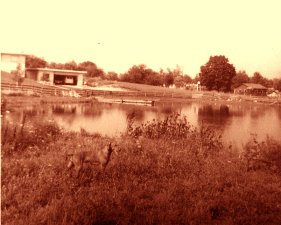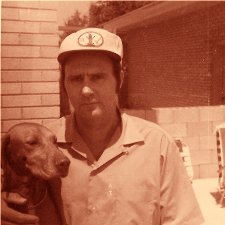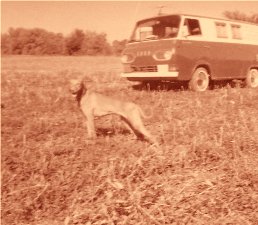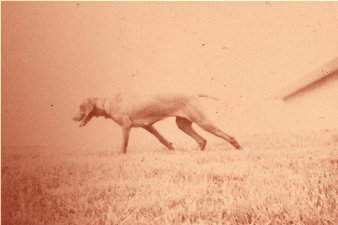|
SECRETS OF FIELD TRIALING
by Bernard Boggs; Written in a state of depression also called a sore loser ;-)
Appears in the Miami Valley Vizsla Club Newsletter March 1977
Clif Boggs learned to hunt & field trial with the above bitch
who would become a member of the VCA Hall of Fame.
Trixie HOF arrived @ 51 Cherry Dr "trained". She just had to train us.
After having competed in the “other” breed field trials for the past five years as an apprentice, so to speak, but incapable of graduating yet. I have learned a few of the dog training practices & the art of running in a field trial. I would like to pass on to the novices & amateurs who are interested in this sport for whatever can be made of them. Understand of course that this represents only a few of the obvious things you will need to know. Practicing them as so many handlers do will not make you the best loved handler, but it won’t make you the worse one either. If you think these things are funny, laugh by all means. Just don’t say they never happened.
- Rough up your dog by any means necessary & do it as long as you can get away with it. Great to do when bracemate is near.
- Always accuse a guy who puts a bell on their dog as using a training aid.
- Wait until your bracemate gets a good distance away & bellow like a sick cow moose.
- Bellow like a sick bull moose whenever your bracemate’s dog checks in with its handler.
- Always carry your lead around your shoulders especially if you always train using the lead as a punishment tool.
- In the back course, holler loud enough so your dog will go so far away that your hollering doesn’t hurt his ears. Do the same thing with the whistle. It helps to learn the signals the other handler uses.
- Teach your dog to “go” on the command “whoa”. Especially good on the cast off.
- Teach your dog to “go” on the command “come”. Especially good on the backcourse & especially good when your bracemate is making a good cast.
- Be sure you don’t allow your dog to make game when you are in no position to control him. Call him off point if necessary cause backcourse birds don’t count or the find is too difficult for your dog to handle. (Birdfields were common at this time. dlb)
- Be sure to walk in front of the handler you are braced with. This prevents his dog from seeing him & will cause the dog to come back closer to check in.
- If your bracemate walks slow, you run. If he runs, you walk.
- If your bracemate looks like he/she is doing good find something to complain about, even if it was last week.
- Be sure to tell the judge while running dogs how wonderful your dog is & how much he has been winning lately.
- If your dog stops to honor a bracemate’s stop to flush, be sure to cast your dog onward first.
- If your bracemate has a point on the course, be sure to insist the judges bring you half a mile away for an honor (At the time this was written an honor was required of every placement dlb) Your voice will usually scare up the bird the other dog is pointing & that dog will be given an unproductive.
- Always find a way to walk through the area your bracemate is pointing to get to your dog, hoping the bird will flush. On horseback it is always easy to lose control of the horse & run over the pointing bracemate.
- If your bracemate gets lost, be sure to involve both judges into looking for him/her.
- In the backcourse if your dog has an unproductive be sure to have some feathers handy or a dead quail. Otherwise exclaim to the judges you seen a running bird.
- Whenever your bracemate gets behind your feet, help him stay there.
- Always find fault with the handler & be sure to criticize the bracemate. It is especially helpful to tell the judge he cut the course & is in the birdfield.
- Always try & make the other handler make a mistake.
- On a divided point (even if you know your dog loves to steal point) argue with the judges until they give your dog credit for a single find, not a divided find.
- Pose a pace with your horseback dog that tires out the bracemate so he is more likely to make a mistake.
- Run like hell when your dog goes on point & scream like a maniac in case the dog might disappear into thin air.
- Always figure out some gimmick to throw off your bracemate just before he/she goes into the birdfield.
- Get the bird planters to put birds in late when you run & early for all others
- Always carry water & insist on watering your dog at the most inappropriate time. If your bracemate is given water, insist that your dog doesn’t need it & find another way to help him rest when it gives the maximum disadvantage to the bracemate.
- When it is hot and your dog goes on point be careful that you do not accidentally kick up the bird so that you can spend plenty of time kicking and hunting around looking for the bird so you can rest your dog. This works best when you spot the bird right away.
- If you know your judge & know unproductives won’t hurt your chances & your dog looks sniffy, whoa your dog. This can be used for a rest and you can wait until you are forced by the judge to release your dog. This can be done several times if you force train your dog to point on command as some do.
- Teach your dog to be immobile while you run a bird through his legs in training. This is a great thing to do is trials when your bracemate honors too close.
- When your bracemate comes in for an honor, sacrifice a point if you can get the other dog out of the stake.
- Always flush your bird so it flies toward or lands near your bracemate.
- Insist on finishing out your dog’s point in a retrieving stake & make your bracemate wait for you to complete your birdwork (Go very slow) (At that time “time” was called when any dog pointed, the other dog if on point had to wait until the other dog was finished to work his bird dlb)
- Encourage the gunners to both shoot at the bird for all bracemate birdwork. Automatics work much better for this.
- If your dog isn’t broke, always be sure to send him for the retrieve before the bird drops. Block if you can get away with it.
- Never allow your dog to get himself into a position where he has to back the other dog unless you are right beside of your dog.’
- If your bracemate is close on their honor be sure to use a lot of voice & gestures when you send your dog for a retrieve.
- Always cast your dog off before your bracemate completes his retrieve.
- Never hear the judges when they ask you to pick up your dog.
- If your dog is picked up, walk him with front feet off the ground, twisting collar as much as you can letting legs get rubbery before putting dog on lead. Let the gallery get away from your so they can’t see what you do to the dog.
- Get judges who are your buddy.
- Never use judges who own other breeds or they might not appreciate the “finer” points of your own breed field trialing.
-
Then, if none of these suggestions helps you to win, protest to the American Kennel Club that the treatment afforded you at this trial is prejudicial to purebred dogs and the field trial sport.
 
 
|